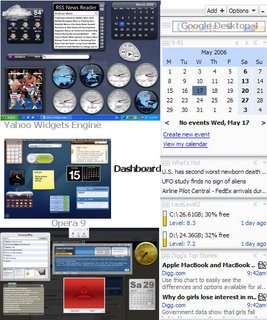
The Yahoo! Widget Engine is an application that allows light-weight files called "Widgets" to live directly on a user's desktop and perform a wide variety of tasks, such as checking for wi-fi presence or strength, finding contacts in an address book, viewing a user's calendar, or checking their latest e-mail. Widgets are built on an open platform, which allows any third party developer to build and distribute their own widgets.
Opera Widgets are small web applications that run directly on a user’s desktop. With Opera Widgets you can quickly write small, focused applications that perform useful tasks. They can interact with online services such as news feeds, dictionaries or search engines. Widgets are self contained Web applications. They may define their own behaviors, and they may offer different levels of interraction. However, widgets will, in general, have a certain level of functionality.
Dashboard is a new world of beautiful accessory applications called widgets that appear instantly to give users immediate access to information like stock quotes, weather forecasts, airline flight tracking, unit of measure, currency conversions and a phone book. With a single click a user's favorite Dashboard widgets instantly appear with up to the second information; with another click they're instantly gone and the user is right back to where they left off. Tiger ships with 14 widgets, and because Dashboard is based on standard web technologies such as HTML and JavaScript, it's easy for third party developers to create new widgets that users can easily add to their Dashboards.
Also announced today, Google Desktop 4 beta - available in English, French, Italian, German, Spanish, Dutch, and Brazilian Portuguese - offers another way for users to improve their search experience, by personalizing their desktops with the introduction of Google Gadgets. These gadgets are mini-applications that reside on users' desktops and deliver a variety of personalized information such as games, media players, weather and news. Google Desktop can also recommend new gadgets and can automatically create a personalized homepage for users based on the subjects they frequently search and access.
Google currently has hundreds of gadgets users can add to their desktops and with the new Google Desktop Gadgets API, developers can easily create and share their own gadgets with other users.
Google Press Center: Press Release
Gadgets are a new category of mini-application designed to provide information, useful lookup, or enhance an application or service on your Windows PC or the Web. Examples might include a weather gadget running on your desktop or on your homepage, an RSS Gadget that pulls in your favorite feeds, or an extension of a business application providing just-in-time status on the pulse of your business.
Gadgets for Windows Sidebar will run on your desktop or dock into Windows Sidebar, an upcoming feature in Windows Vista alongside other applications. Desktop Gadgets can developed using Windows Presentation Foundation, DHTML/Atlas, and even ActiveX controls. The beauty of Desktop Gadgets is that they are visually and programmatically rich - scaling from vector-based graphics and managed code to standard techniques you’d use for the Web.
Microsoft Gadgets Blog
Do you like widgets? What do you think is the best product that delivers widgets without consuming all your memory?
Note: You can view this blog post as a Google Notebook.
Note: You can view this blog post as a Google Notebook.

I've been wondering about the security implications of widgets. They're executables on the local system, they're not restricted or sandboxed that I know about, but sites are encouraging people to create and share them. It seems like a receipe for security problems.
ReplyDelete